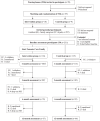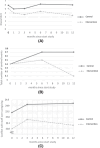Namaste Care Family for people with dementia and family-A randomized controlled trial
- PMID: 40684251
- PMCID: PMC12276077
- DOI: 10.1002/alz.70495
Namaste Care Family for people with dementia and family-A randomized controlled trial
Abstract
Introduction: Few evidence-based psychosocial interventions target people with advanced dementia.
Methods: Namaste Care Family is a daily multi-dimensional care program to improve quality of life (QoL) of people with dementia and their family caregivers. In this cluster-randomized controlled trial, adjusted linear mixed models were used to analyze effects at 1, 3, 6, and 12 months follow-up. Ten nursing homes implemented the program (n = 116) while nine nursing homes provided care as usual (n = 115).
Results: The intervention group showed less discomfort (-1.06; 95% confidence interval [CI] = -1.88 to -0.23) and fewer sentinel events (-0.40; 95% CI = -0.64 to -0.16), specifically pneumonia (-0.08; 95% CI = -0.14, -0.02). There were no differences in residents' QoL, challenging behavior, and medication use. There was no effect on positive caregiving experiences, caregiver burden or guilt, whereas conflict with staff was lower at 12 months (-2.04; 95% CI = -4.07 to -0.01).
Discussion: Namaste Care Family has some beneficial effects on residents with dementia and family caregivers.
Clinical trial registration: This trial was registered with the CCMO Research with human participants (old ID 5692/new ID 5570).
Highlights: Namaste Care Family involves family in a daily program for residents with dementia. Residents' quality of life did not improve (primary outcome) due to the program. Also, family's positive caregiving experiences did not improve (primary outcome). Namaste Care Family reduced discomfort and sentinel events in people with dementia. Family caregivers' conflict with staff over caregiving decreased due to the program.
Keywords: Namaste Care; cluster randomized control trial; dementia; family caregivers; palliative care; quality of life.
© 2025 The Author(s). Alzheimer's & Dementia published by Wiley Periodicals LLC on behalf of Alzheimer's Association.
Conflict of interest statement
H.S. became an unpaid member and associate director of Namaste Care International after this study was completed. The other authors have nothing to disclose. Author disclosures are available in the Supplementary Information.
Figures


References
-
- Van der Steen JT, Radbruch L, Hertogh CM, et al. White paper defining optimal palliative care in older people with dementia: a Delphi study and recommendations from the European Association for Palliative Care. Palliat Med. 2014;28(3):197–209. - PubMed
-
- Beerens HC, Sutcliffe C, Renom‐Guiteras A, et al. Quality of life and quality of care for people with dementia receiving long term institutional care or professional home care: the European RightTimePlaceCare Study. J Am Med Dir Assoc. 2014;15(1):54–61. doi: 10.1016/j.jamda.2013.09.010 - DOI - PubMed
-
- Brookes RL, Herbert V, Paul S, Hannesdottir K, Markus HS, Morris RG. Executive dysfunction, awareness deficits and quality of life in patients with cerebral small vessel disease: a structural equation model. Neuropsychology. 2014;28(2):247. - PubMed
-
- Boller F, Verny M, Hugonot‐Diener L, Saxton J. Clinical features and assessment of severe dementia. A review. Eur J Neurol. 2002;9(2):125–136. - PubMed
Publication types
MeSH terms
Grants and funding
LinkOut - more resources
Full Text Sources
Medical

